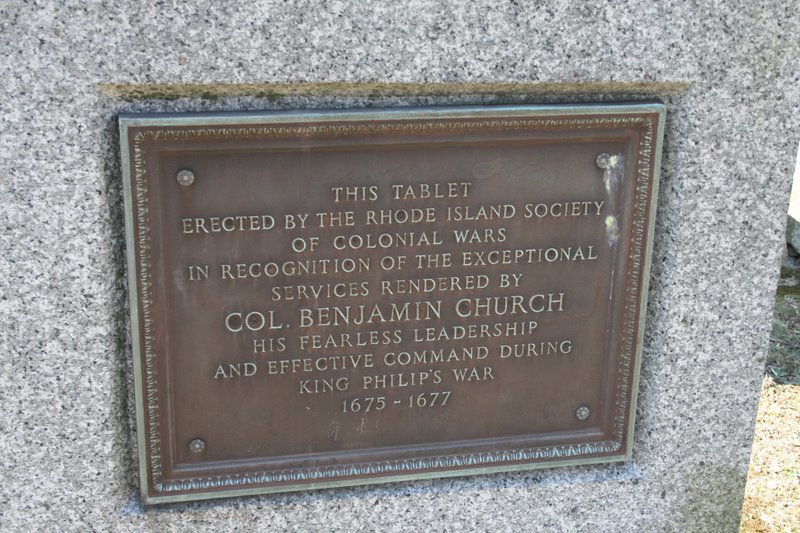Born in Plymouth Colony in about 1639, Church married Alice Southworth, daughter of Constant Southworth, step-son of Governor William Bradford, on December 26, 1667 in Duxbury, Massachusetts. He resided for a time in Duxbury and later moved to Sakonnet (now Little Compton), Rhode Island.
Church was a principal aide to Governor Josiah Winslow of Plymouth Colony. Remembered primarily for leading small groups of fighting men, referred to as Rangers, during King Philip's War (1675–1676).
During that war, for six hours, COL Church and just thirty seven other Englishmen from Plymouth Colony withstood an assault by more than three hundred Indians. That battle became known as the Pease Field Fight, the location of which is located west of modern Nonquit Pond, between Tiverton and Little Compton, RI.
Church was eventually allowed to recruit Indians when traditional Army tactics of the times proved unsuccessful. He persuaded many neutral or formerly hostile Indians to join his unit, where they operated skillfully as irregular troops.
In June of 1676, Church signed an agreement with Awashonks, the Sakonnet sachem, at "Treay Rock" in modern Little Compton, RI, guarenteeing a truce between the Sakonnets and the English.
King Philip's War came to an end on 12AUG1676 when one of Church's Indian Rangers (John Alderman) killed King Philip. Upon inspection of Philip's body, Church is quoted as saying "a doleful, great, naked, dirty beast".
Philip was shot, draw and quartered and be-headed. His severed head was reportedly displayed at Plymouth for twenty years.
Over the next 28 years, Church led five New England raiding parties into Maine and Canada against the French and Indians; he carried out devastating raids in Acadia.
Though sometimes considered America's first "Great Indian Fighter", Church's first inclination was to try and find common ground with the Native People. Indeed, when first settling in Sakonnet, he was the only Englishman for miles, surrounded by Indians on three sides, the Sakonnet River on the other.
In addition, Church vehemently opposed Governor Winslow's decision to sell Indian captives into slavery and sought clemency for former Indian rivals after the war.
COL Church dictated his story to his son Thomas, first published in 1716 as "Entertaining Passages Relating to Philip's War". Various editions have been published since, including "The History of Philip's War, Commonly Called the Great Indian War of 1675 and 1676", edited by Samuel Drake in 1829 and reprinted in 1989 by Heritage Book, Bowie, MD.
Legacy
Generally regarded as the founder of Little Compton, RI.
COL Church was the grandfather of Dr. Benjamin Church, the first "Surgeon General" (though that title came later) of the Continental Army. In 1776, Dr. Church was arrested for treason for selling information to Governor Gage and the British in Boston in 1775-1776.
References
US Army Ranger Hall of Fame
Philbrick, Nathaniel, Mayflower: A Story of Courage, Community, and War. New York: Viking Penguin, 2006. ISBN 0-670-03760-5
Born in Plymouth Colony in about 1639, Church married Alice Southworth, daughter of Constant Southworth, step-son of Governor William Bradford, on December 26, 1667 in Duxbury, Massachusetts. He resided for a time in Duxbury and later moved to Sakonnet (now Little Compton), Rhode Island.
Church was a principal aide to Governor Josiah Winslow of Plymouth Colony. Remembered primarily for leading small groups of fighting men, referred to as Rangers, during King Philip's War (1675–1676).
During that war, for six hours, COL Church and just thirty seven other Englishmen from Plymouth Colony withstood an assault by more than three hundred Indians. That battle became known as the Pease Field Fight, the location of which is located west of modern Nonquit Pond, between Tiverton and Little Compton, RI.
Church was eventually allowed to recruit Indians when traditional Army tactics of the times proved unsuccessful. He persuaded many neutral or formerly hostile Indians to join his unit, where they operated skillfully as irregular troops.
In June of 1676, Church signed an agreement with Awashonks, the Sakonnet sachem, at "Treay Rock" in modern Little Compton, RI, guarenteeing a truce between the Sakonnets and the English.
King Philip's War came to an end on 12AUG1676 when one of Church's Indian Rangers (John Alderman) killed King Philip. Upon inspection of Philip's body, Church is quoted as saying "a doleful, great, naked, dirty beast".
Philip was shot, draw and quartered and be-headed. His severed head was reportedly displayed at Plymouth for twenty years.
Over the next 28 years, Church led five New England raiding parties into Maine and Canada against the French and Indians; he carried out devastating raids in Acadia.
Though sometimes considered America's first "Great Indian Fighter", Church's first inclination was to try and find common ground with the Native People. Indeed, when first settling in Sakonnet, he was the only Englishman for miles, surrounded by Indians on three sides, the Sakonnet River on the other.
In addition, Church vehemently opposed Governor Winslow's decision to sell Indian captives into slavery and sought clemency for former Indian rivals after the war.
COL Church dictated his story to his son Thomas, first published in 1716 as "Entertaining Passages Relating to Philip's War". Various editions have been published since, including "The History of Philip's War, Commonly Called the Great Indian War of 1675 and 1676", edited by Samuel Drake in 1829 and reprinted in 1989 by Heritage Book, Bowie, MD.
Legacy
Generally regarded as the founder of Little Compton, RI.
COL Church was the grandfather of Dr. Benjamin Church, the first "Surgeon General" (though that title came later) of the Continental Army. In 1776, Dr. Church was arrested for treason for selling information to Governor Gage and the British in Boston in 1775-1776.
References
US Army Ranger Hall of Fame
Philbrick, Nathaniel, Mayflower: A Story of Courage, Community, and War. New York: Viking Penguin, 2006. ISBN 0-670-03760-5
Inscription
‘Here lyeth interred the [body]
of the Honorable
Col. Benjamin Church, Esq.,
who departed this life, January 17, 1717-8 in
the 78 yeare of his age.’























